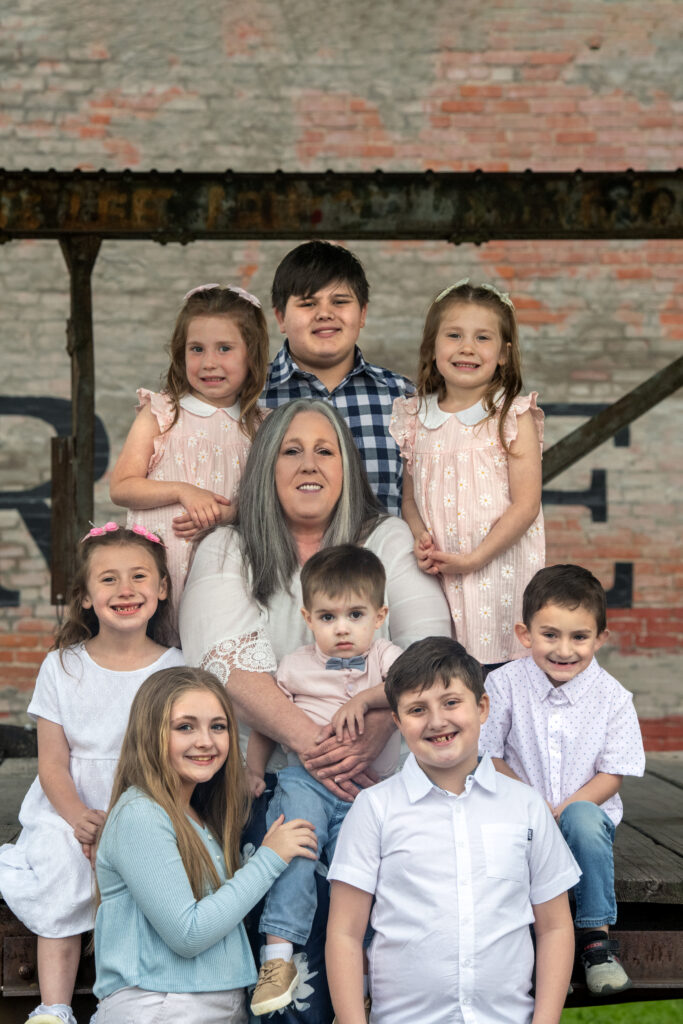Learning to smile again
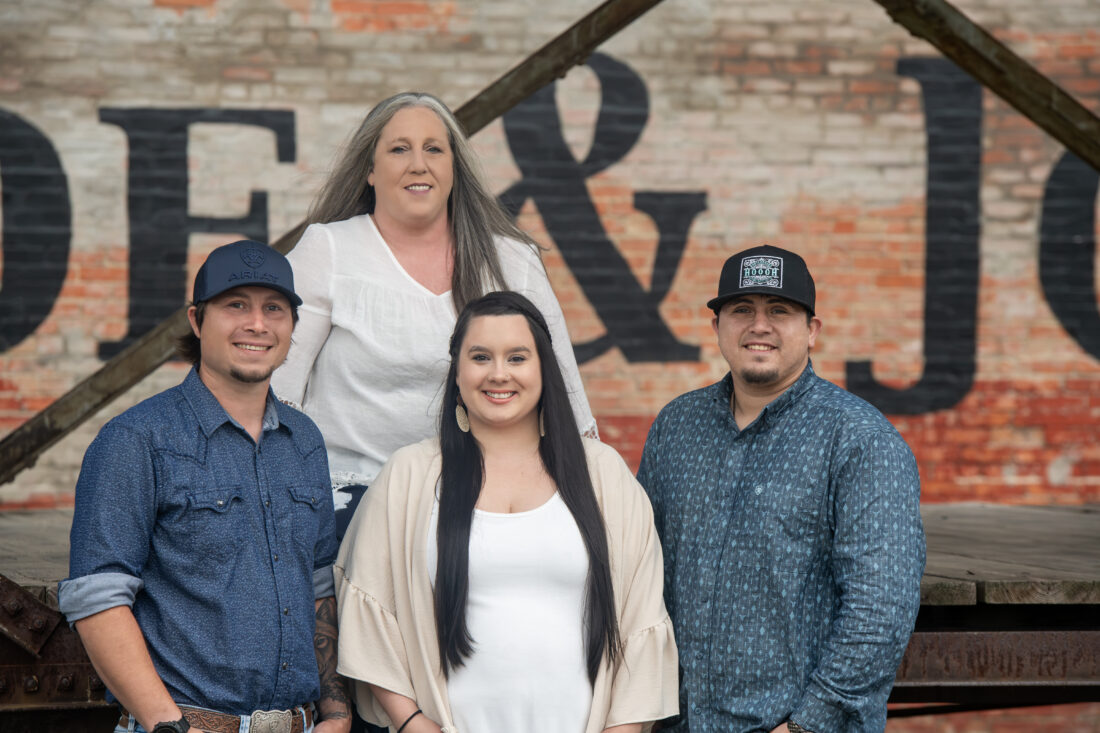
Aimee Anderson, 53, raises the mirror to her face and tentatively smiles.
“Do I have an upper lip?” she asked.
Fourth-year dental student Frannie Gall had just placed dentures in Anderson’s mouth, one of numerous fittings in a year-long process to restore her smile.
“I haven’t had lips; they kind of sunk in with no teeth,” Anderson said, as she gazed at her reflection. “But I might be able to wear lipstick now.” Her eyes sparkle at the promise of a new beginning.
For the last 18 years, Anderson has worked to regain her life. She used drugs for almost two decades, but when she became sober in 2006, she restored her relationship with her children, regained the trust of her family and friends and started cleaning houses in Kemp, Texas, her hometown. Despite these victories, there was still one thing she wanted back – her smile.
In 2023, she nervously walked into the Texas A&M School of Dentistry to start the journey, and in 2024, she left the clinic with a beautiful set of dentures, renewed confidence and a fresh outlook on life.
Battling addiction and despair
Anderson’s relationship with drugs and alcohol began when she was a teenager. Like many kids, she started drinking because it was perceived as the “cool” thing to do. Looking back, she realizes she began drinking, and later taking drugs, to cope with painful situations in her personal life.
“Addiction is always the outcome of some sort of inner turmoil within ourselves … some sort of belief system we have picked up along the way about ourselves,” she said. “When drugs or alcohol are introduced to us, we use to cover up pain we feel or to calm fears we have and in doing so we begin a pattern that leads to addiction.
“My main drug was methamphetamines, but I’ve done many others.”
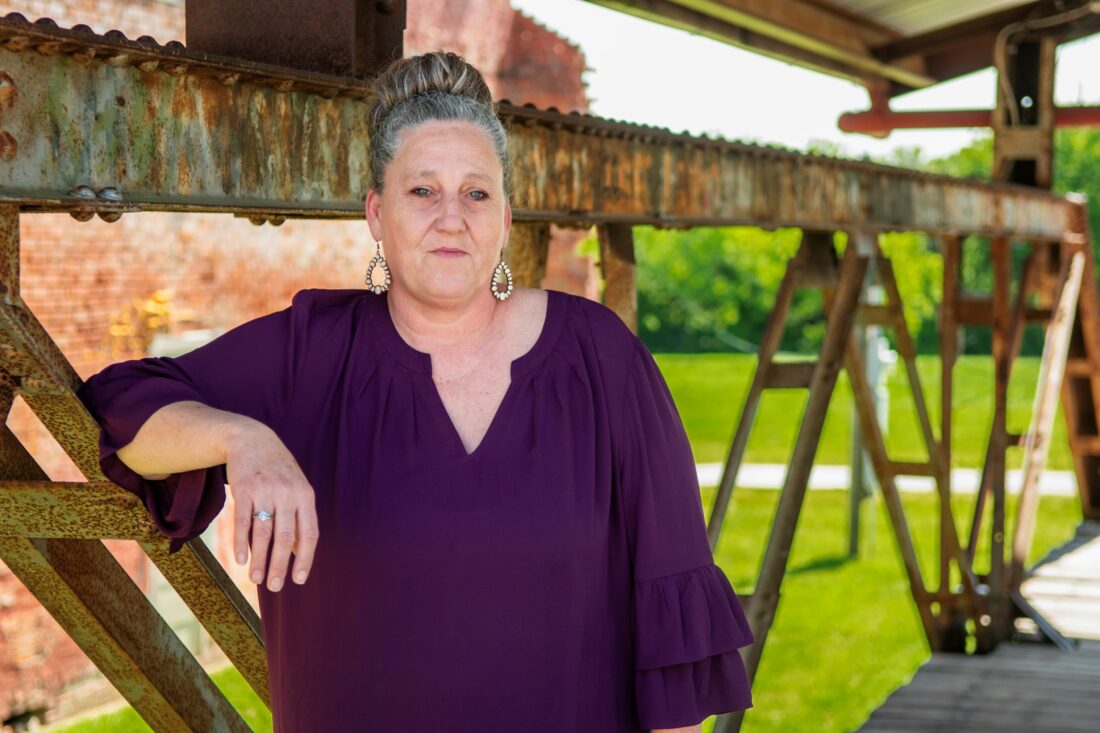
Anderson used drugs for almost 20 years, the last five of which she described as “rock bottom.”
“My kids were getting old enough to realize what was going on, so in my mind, if I couldn’t stop, then I didn’t deserve to be here with them,” she said.
She left her three young children with her parents in Kemp and moved to Terrell, just 20 miles away. With no place to go, she lived on the streets and spent her days trying to get her next fix.
“When you’re out there on the streets and in a cycle of drug use, time is not the same,” she said. “You think ‘I’ll go home tomorrow’ … and then tomorrow … and tomorrow turns into five years.”
Despite being at her lowest – mentally and physically – her children pulled at her heart, motivating her to get sober and go home. With no outside help and still living on the streets, she devised a plan to wean herself off drugs and eventually quit.
“I was an IV drug user, but the last year [on the streets], I started smoking instead,” she said. “After using the IV all those years, I was trying to wean myself off, so I could come home. I would just smoke it; I wouldn’t use the needle anymore. But even that was hard, going from one to the other.”
By the time she showed up on her parents’ doorstep in 2006, she was sober. Anderson believes if she had not quit at that time, she wouldn’t be alive today.
“It was coming to that point where I was not healthy at all,” she said. “I was already in my 30s, and I don’t think I would have made it another year on those streets.”
Emerging from the darkness
Due to the drug use, Anderson started having dental problems in her 20s. Her back teeth deteriorated first, and her front teeth began to break in her early 30s. With little to no access to dental care, she’s lived in varying states of pain and managed abscesses on her own for years.
“Sometimes I would get antibiotics, but most of the time I just put salt on it,” she said. “I knew gargling with salt water helped, so I wondered what straight salt would do. It killed the pain. I’m pretty sure it wasn’t good for my gums, but you gotta do what you gotta do.”
Anderson said being back home was stressful at times, but the joy of reconnecting with her kids overshadowed any difficulties.
“They were into all the sports, and I had missed out on a lot of that,” she said. “I was trying to make up for lost time. I just made up my mind that whatever happened, I wasn’t going to run away again.”
And she was determined to hang on to her sobriety, too. Anderson never had professional help, but over the years, she spent a lot of time studying self-help books and learning about her triggers.
“I try to understand why I did the things that I did and what my triggers are,” she said. “If you can recognize your triggers and patterns and change those, then you can get past it. That’s the main thing that helped me through all of it. And I had a good support system in my family.”
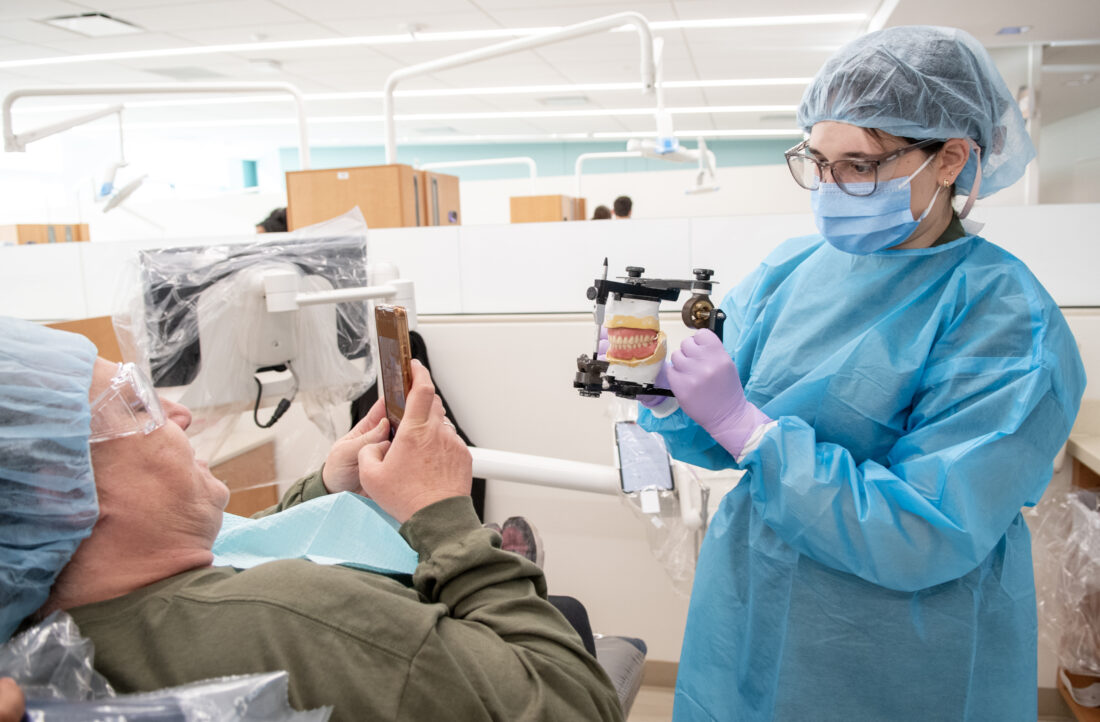
The one thing Anderson could not fix on her own was her teeth. Her smile was the final roadblock to a renewed sense of self, and it seemed out of reach until her best friend, Christi Neal, accepted a job at the dental school. Neal, executive assistant in the dean’s office and mayor of Kemp, joined the staff in September 2022.
Anderson describes Neal as a “fixer.” Their boys were childhood friends, and Neal first met the family when the police brought the boys – then 8 – to Neal’s home. They had been caught throwing rocks at streetlights.
Neal didn’t know Anderson’s family at the time, but as the boys’ friendship grew over the years, along with their troublemaking, Neal began to realize no family is immune to challenges, no matter their backgrounds.
When Anderson returned to Kemp, Neal was not only a resource for the family, but she also became a trusted friend.
“What started out as her mission to fix me has turned into a long, withstanding friendship,” Anderson said. “Out of love for my little boy, who was best friends with her little boy, she set out on a mission to save his mother.”
Seeking a new smile
Neal started a GoFundMe account to cover the cost of treatment, with several Kemp families making donations, and drove Anderson to every appointment.
Her first trip to the dental school was in March 2023, on the heels of another devastating period in her life. Within an eight-month time frame, she lost her fiancé, a longtime love who had reentered her life; her father; and her mother.
“I had been going through the healing and grieving process for the previous year,” she said. “But I’m proud of myself because the person I was before, I would have turned to something to kill that pain, and I didn’t do that.
“If I can get through all that and not go back, then I never will. That was a big test.”
Still, she entered the clinic brokenhearted and nervous about how she would be received.
“She was worried what people would think,” Neal said. “But they actually did a little celebration for her in the clinic when she told them she was 17 years sober. She said she didn’t feel judged at all; everybody was excited for her.”
Dr. Christine Chu, prosthodontist and clinical assistant professor supervising the treatment, said Anderson was an ideal teaching case because she was a straight-forward full mouth rehabilitation denture case.
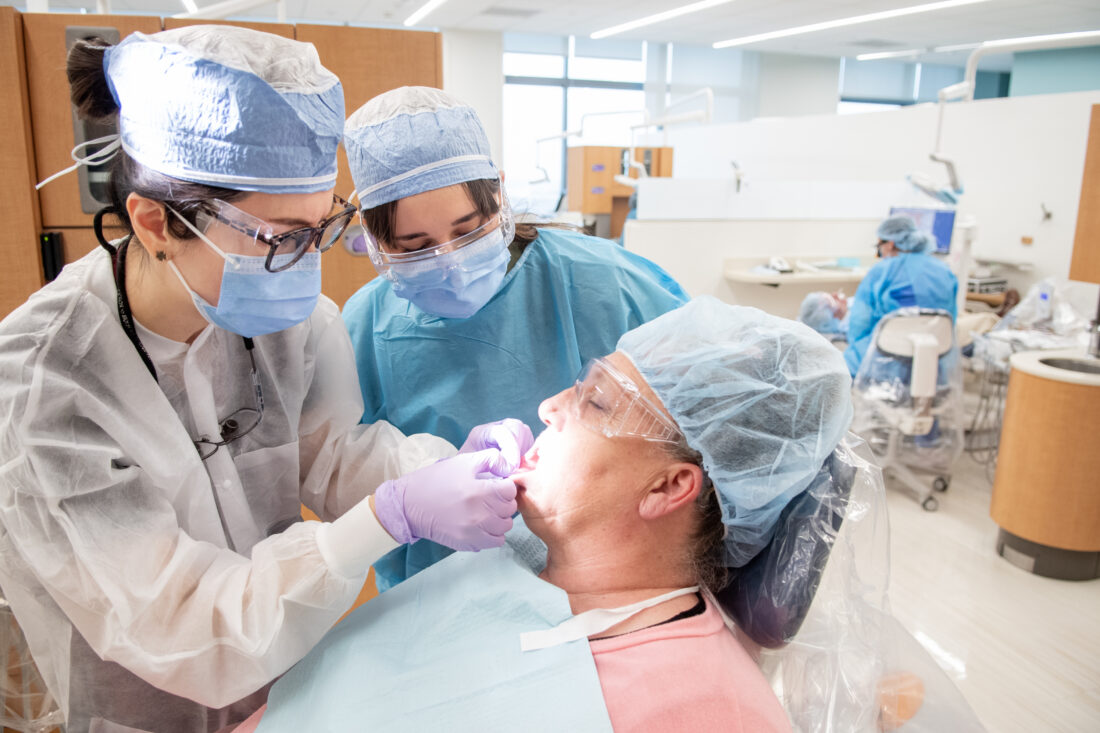
“When we’re looking for good teaching cases with regard to denture patients, some things we want are a favorable jaw relationship, an unremarkable medical history, the absence of anatomical abnormalities and the patient’s overall demeanor and ability to sacrifice their time for educational enrichment,” Chu said. “What made Aimee special was her kindness, understanding and flexibility in accommodating all the necessary appointments and minor setbacks that can occur in an academic setting.”
Gall, who treated Anderson, said the initial oral surgery was the most difficult step.
“She had a few teeth left, so we removed those and then did an alveoplasty, where we basically smooth the bone that was left,” Gall said. “We want the denture to have a rounded base to sit on so there’s no rubbing or spots that pinch.
“It was hard to maintain anesthetization because of her previous history of drug use, and I was worried about that the most. I didn’t want her to be traumatized or in pain.”
Chu said Gall was chosen specifically for this case because of her “outstanding dental ability and compassionate, caring persona.”
“Patient assignments are usually random, but it always helps when the patient and student ‘click,’” Chu said. “This was one of those pairings that could not be more perfect. I think both Frannie and Aimee will always remember one another after this experience.”
Anderson’s mouth was allowed six weeks to heal following the initial oral surgery, but a second alveoplasty was required to finish reshaping her gums. After another six weeks of healing, Anderson had a series of tedious appointments over several months that included impressions, fittings and bite tests.
“Aimee was just really positive,” Gall said. “She was so patient and understanding through the surgeries and various relines. She had so much grace, even though she had been waiting so long.
“I learned a lot from her, and when I think things are bad or hard, I think I’ll remember this and take that same kind of attitude.”
Celebrating a fresh start
Anderson was originally scheduled to receive her dentures on Leap Day – Feb. 29, but during the final fitting, Gall realized there was a problem. The laboratory that fabricated the dentures had inadvertently trimmed too much off one side in the final adjustment, making the top denture too loose.
Although Anderson was disappointed, the setback seemed kismet when the new delivery day was set for March 6 – almost exactly one year since her first appointment at the dental school.
Going from no teeth to dentures is no easy task, though. Anderson had to learn how to eat, talk and smile with her new teeth. But like always, she batted away discouragement and called on her ability to overcome.
“With all the hardships she’s had in her life, she doesn’t let it impact her negatively,” Neal said. “Everything seems to impact her positively. No matter what the circumstance.
“When I think about where she’s come from, how many people could do what she’s done? She really is the strongest person I know.”
In early April, Anderson and her family gathered for a portrait in downtown Kemp. Wearing bright lipstick, she beamed as her grandchildren ran through the park, swarming her. Ranging in age from 2 to 14, they are the center of her world, and she never misses a ballgame or birthday party.
“Well, this is everybody!” she said proudly, throwing her arms open wide and smiling even wider.
It’s a moment she doesn’t take for granted – a moment she might have missed. They all yell “cheese” in unison as the camera shutter clicks.
“Learning to smile again is something I never thought possible,” she said, “but here I am, smiling this beautiful smile! No longer hiding it from the world.”
